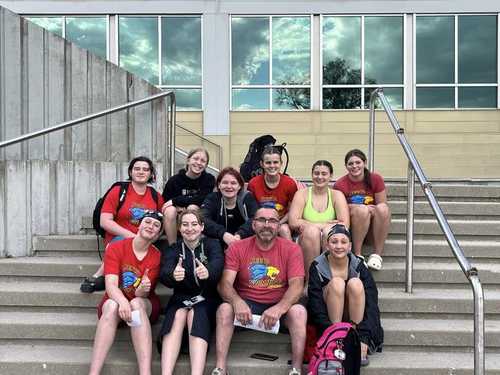Features
September 17, 2024
2024 National Coaches Week Feature

Tom Hainey
Back when he was a youngster growing up in the beauty of northwestern Ontario, Tom Hainey had made it quite clear that he wanted to “define himself”.
Two special words. As he recalled them in a conversation the other day, he emphasized that there was nothing that would stop him from achieving that objective. Yes, he’s achieved that – and in many ways.
Hainey had a birth defect and in area of his spinal column that didn’t form properly and the physical impairment had affected his ability to walk.
With career aspirations of studying medicine, Hainey instead found himself devoting a great deal of time in hospitals as a patient. There, he learned about something new to his vocabulary - spina bifada. In medical terminology, it’s defined as a weakness, or what can also be a total paralysis, of the legs. Statistics in North America, reveal one of every 2,500 births have a congenital defect of the spine.
In the 1970’s, Hainey would hear of some medical professionals insinuating that people, with that kind of debilitation, would feel like they’re sentenced to a life in a wheelchair. That didn’t sit well with Hainey and others. While he did have surgery to remove a tumour in his lower spine, Hainey continues to emphasize that he has never spent a day of his life in a wheelchair.
“I was diagnosed (with spina bifada) as an infant and people can see I have a disability,” he said. “The treatment that I had received, I have nothing but adoration for those people who helped me - and that includes my family - because they changed my life for the better. My mother taught me to walk, and my father helped me learn to swim. With all that, I was on a pedestal.”
Hainey would find himself on a different kind of pedestal in the years to follow – and it would happen quite a bit.
“It was swimming that gave me a wonderful life and I wasn’t, what people would call, that crippled kid. I would go on to swim competitively, and train, with able bodied individuals. I had felt good and realized there was so much I could accomplish.”
Hainey was in a life he was born to live. Self-confidence helped him accomplish happiness. That led him to become increasingly profound tin finding a love for the sport of swimming.

Learning to swim may have started when he camped, with his family, around French Lake. Things picked up when he joined the Nakokita Swim Club in Atikokan, a small town he called home. It’s often referred to as a gateway to outdoor adventures, canoeing and a wilderness lifestyle.
Hainey’s coach and parents were approached by a swim official from Thunder Bay who had inquired on whether he would be interested in participating in competitions for athletes with disabilities. Initially, Hainey was reluctant because he didn’t see himself as an athlete with a disability.
He would change his mind. Hainey went on to compete at the Northwestern Regional Games for the Disabled in Thunder Bay. Word quickly spread that he was someone to watch for the future.
“I was competing with able bodied swimmers, won races but what was happening also changed my focus and I realized that there was a legitimacy to competitions for people with disabilities,” he said.
There was a time when Hainey would only settle for the best. As a competitive swimmer, that made sense – and especially when, at age 19, he would become the first carded Canadian swim athlete with a disability. A gold standard had been set.
In 1984, Hainey would win his first major international race – the 100-metres breaststroke – and he did it in a world record time. It happened at the International Games for the Disabled, commonly known as the Summer Paralympics held in England. But Hainey wasn’t finished. He left the competition with five medals and three world records.
Hainey would go on to create his own legacy in the pool, thinking like a champion, winning medals and competing at Paralympic Games in 1988 in South Korea and 1992 in Spain.
However, things changed. Hainey was affected by trauma and tragedy. His passion evaporated along with his motivation. First came a serious accident. He fell from a fourth-floor outdoor railing, while visiting with friends at the University of Manitoba. Hainey had shattered his wrists, broke his femur and fractured his skull. He knew he was lucky to live through that ordeal.
At 27 years old, his world collapsed. He had hit a low point in his life. Reports revealed that his mother had died in a vehicle accident. Life would be different, another challenge, but he would persevere.
Hainey, who had earned a university degree, would transition to the world of coaching. He tinkered with it at age 16, as an assistant while also swimming, and wouldn’t let go. He is now in his 42nd year as a coach.
“I knew I could (coach), I loved kids, and I wanted to share my success in the pool with others,” he said. “I was offered a coaching job in Winnipeg with the Manta Swim Club, and it would last for 20 years.”
With National Coaches Week September 16-22, Swim Ontario – Canada’s largest provincial swim organization - salutes Hainey, and hundreds more, for their clear, concise, dedicated and decisive contribution in coaching. The positive impact they have on athletes is nothing short of impressive.
“Swimming, coaching, helping others – it’s what keeps me going,” he said, with emotions crackling in his voice. “I am grateful for so many things. I have learned from tragedy and know that I have positively impacted the lives of many young people.”
Hainey had returned to Atikokan several years ago, is manager of community services for Atikokan, and resurrected the Nakokita Swim Club that had been dormant. With a town population of 2,800, Hainey’s swim club has 33 members - and they train at the Atikokan Municipal Swimming Pool.
Memories live on for Hainey. In 1993, at the age of 28, he honored the memory of his mother, who he calls a source of inspiration helping him learn and overcome barriers, when he devoted three days to swim 97 kilometres at Quetico Provincial Park. It’s a world-famous destination, not far from Atikokan. A year later, another huge moment in his life.
“All I had wanted was to legitimize our sport at an able-bodied event in my country – and it happened,” he said. “The Commonwealth Games were taking place in Victoria, B.C. – and competing was all that mattered. It was something very special to me.”
David Grossman is a veteran multi award-winning Journalist and Broadcaster with some of Canada’s major media, including the Toronto Star and SPORTSNET 590 THE FAN, and a Public Relations professional for 50+ years in Canadian sports and Government relations.
(Banner Photo: Ian Kaufman, TBnewswatch)
